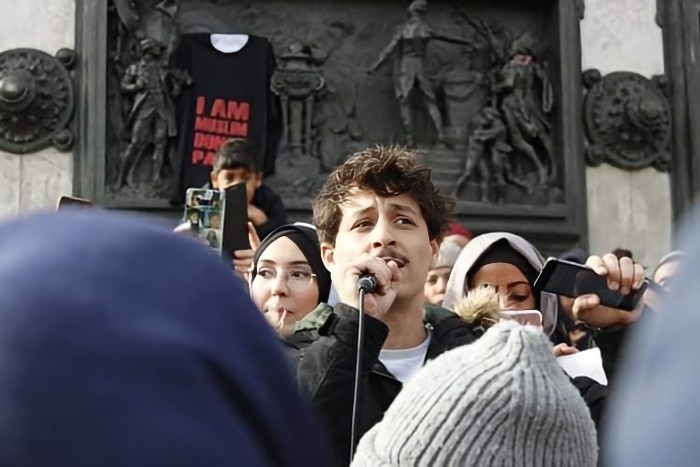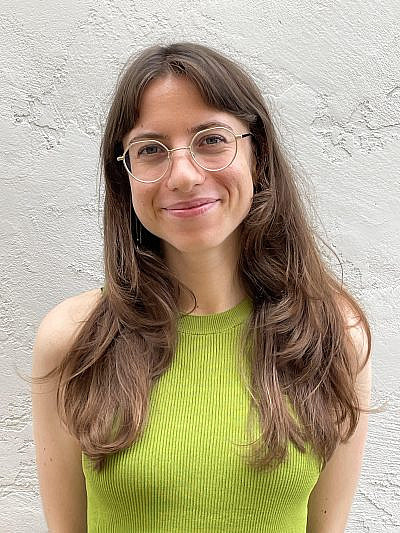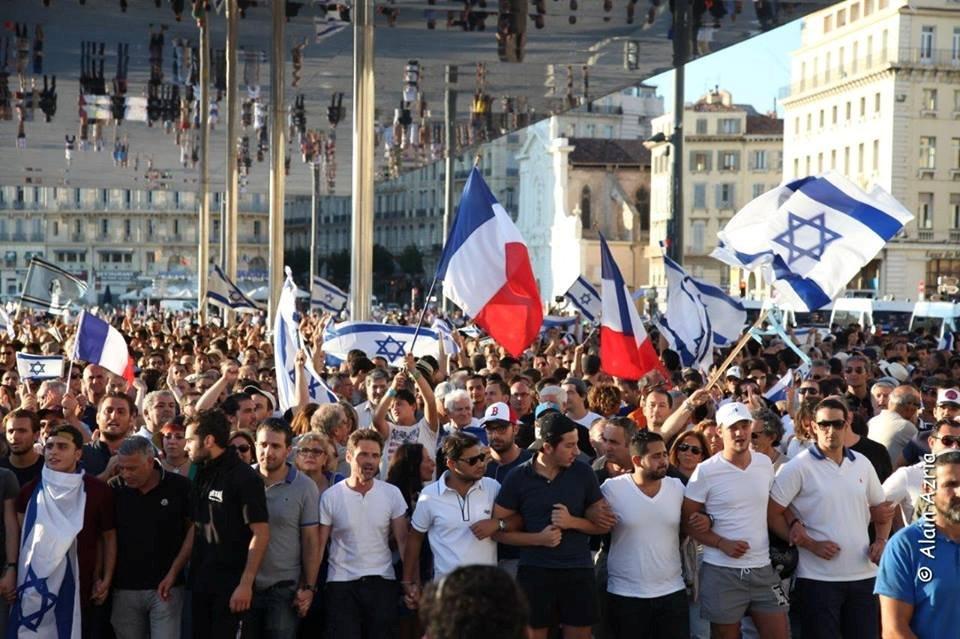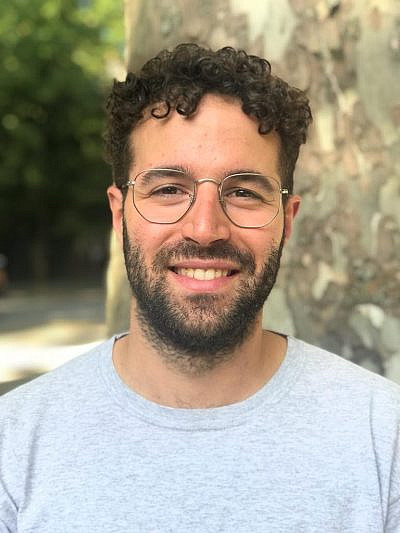“As long as the state is racist and colonialist, we as Jews should not rely on it for our protection and well-being.”
That this statement could easily be read as a progressive critique of Israel, but is actually referring to France, is no accident. It was spoken by a member of Tsedek!, a French-Jewish decolonial collective, during an interview with +972. The group, which launched its manifesto earlier this year, applies its anti-racist and anti-colonial framing to both France and Israel-Palestine, as part of a global “political project of justice for all.”
In a country where the Jewish community is overwhelmingly pro-Israel, and where criticism of the occupation is almost non-existent, Tsedek! is intent on forging a new path. The group — whose name derives from the Hebrew word for “justice” or “righteousness” — rejects efforts in France to portray Zionism as somehow compatible with anti-racist and liberatory struggles, insisting, as per their manifesto, that “[a] Jewish anti-racist voice can only be anti-Zionist.”
Tsedek! is also set apart by its concurrent focus on French oppression against Black and Arab communities, many of whom originate from the countries France once colonized. “[T]here’s a real interest in combining both of these focuses — state racism in France and apartheid in Israel-Palestine — and doing it as Jews,” said Deborah Leter, a Franco-American doctoral student based in Paris. Although a veteran left-wing French-Jewish group, Union Juive Française pour la Paix, also works on opposing oppression in both countries, it primarily remains known as a Palestinian solidarity group, Leter said.
The hope for Tsedek! is that it will become the biggest group of its kind in France yet — with an analysis that will open the door to a broader coalition with other oppressed groups, guided by “an anti-racist politics that stems from our Judaism,” in the words of Simon Assoun, a Tsedek! member and educator whose family is originally from Algeria.
Hanging over much of Tsedek!’s work, however, is the specter of antisemitism — both the high-profile incidents that have made headlines in France and around the world in recent years, and its weaponization as a means of shutting down criticism of Israel. The organization’s members are attuned to these complexities, and are determined to fight antisemitism as an integral part of the anti-racist struggle.
Even as they try to make those inroads, though, the group understands that it first needs to break down what Assoun calls the “siege mentality” of the French-Jewish community. And for Tsedek! member Nadav Joffe, who has lived in both Israel and France and who spoke the words at the top of this piece, much of that work involves disentangling the fears French Jews hold onto.
Fear “shouldn’t be the motor for your political orientation,” Joffe told +972. “There is something about fear being the fuel for politics inside Jewish communities that we need to address. And it’s very hard.”
The following interview with the three Tsedek! activists has been edited for length and clarity.
Tell us about Tsedek!
Simon Assoun: Tsedek! was born from a mixture of [people from] UJFP and other Jewish activists. UJFP was the only Jewish organization in France with a decolonial voice and a decolonial project, and that fought against Zionism and supported Palestinian rights, and that had anti-racist policies — for example, against French police violence and against Islamophobia. It also had a specific frame for antisemitism, because this fight has been instrumentalized and hijacked by the political class in France. It is used as a means of reasserting the authority of the state, legitimizing racist and repressive policies, and combating the left and anti-racist movement.
The idea was to have a collective that could bring together all that energy into an outfit that would be bigger than UJFP and born out of solidarity with Palestinians, and with an anti-racist politics that stems from our Judaism.
Deborah Leter: Another reason why there was a desire for something else was to have something a bit more dynamic, a bit younger. There’s a generational gap — Tsedek! is mostly young people; it’s not closed off to anyone at all, but it happens to be a group of younger activists who are also very focused on racism in France, and not just Israel-Palestine. There’s a real interest in combining both of these focuses, and doing it as Jews.
Why was it important for you, as a Jewish group, to adopt a decolonial identity?
DL: In the French context, and globally, it’s very controversial to use the word “decolonial.” Even talking about postcolonialism isn’t really integrated into the French political realm; we’re about 30 years behind the U.K. and the U.S. So saying that you’re adopting a decolonial stance sets you apart from the broader anti-racist movement and discourse.
It’s a way to acknowledge that colonial legacies are continuing in the present and that they are at the root of systemic racism, and that the anti-racist struggle needs to take into consideration the colonial roots of contemporary racism. It’s also a way for us to show our solidarity with the French decolonial movement, which is primarily composed of Black and Arab communities — and definitely not Jewish communities.
There are Jewish leftist organizations in France that claim to be anti-racist, but they don’t claim to be decolonial, in part because they reject the decolonial movement in France and consider it to be antisemitic, partly because of its support for Palestinian rights. So it’s also a political choice on our end to claim that we are part of this broader movement that includes other minorities. That’s part of our discourse — that even though we face different experiences, we have all been “othered” by the French state.
France also still has some forms of colonies in the world that are ruled using neocolonial methods. So when we identify as decolonial, we’re sending a message that we’re standing in solidarity against French neocolonialism.
SA: Jews in France don’t have the same history as Jews in the United States. Today, Zionism is very important in French-Jewish communities. Their identification with Israel greatly impacts their relations with other groups that are victims of racism, and they are instrumentalized by the French state against these other minorities.
DL: Something that’s interesting in the French-Jewish leftist community is the idea that “we can be Jewish, anti-racist, and Zionist,” and that Zionism is a fundamentally misunderstood liberation ideology. They put decolonial demands from Black and Arab communities in France on the same level as the desire for Jewish liberation in Israel, and try to legitimize Zionism within that context.
As anti-racists, we [Tsedek!] cannot support an ethnonationalist state, and our vision for Jewish safety, liberation, and self-determination does not need to happen via a racist state that perpetuates oppression on another community.
What is it specifically about France’s colonial policies vis-à-vis Jews and Muslims that makes it so important for you to push back on that history?
Nadav Joffe: The clearest step is to look at the Crémieux Decree [an 1870 law that granted most Jews in French-ruled Algeria French citizenship, while denying the same to Muslims]. French-Jewish people had a specific status under colonial rule, which tore them apart from their societies, especially in North Africa.
SA: The majority of Jews in France are Sephardic and from North Africa, so they were subjected to French colonization and racism. They were assigned a specific place in the social relations of race. It’s important to understand this history, how it has shaped French Judaism, and how relations with other racial minorities are marked by French colonialism to this day. They are also marked by Zionism and the State of Israel, which is part of the same world of Western modernity.
We believe it is harmful for Jews to separate the fight against antisemitism from that against all forms of racism, [including] in France and in Israel. Political actors who accept this misguided framing are either reactionary, or have a poor understanding of the social relations and political mechanisms that produce and reproduce antisemitism.
Zionism and Israeli colonialism are aimed at Jews the world over. Tomorrow, I can go to Israel, get citizenship, settle there — maybe in an apartment that used to belong to a Palestinian family. It’s a question of responsibility, and of strategy and politics. The Palestinian cause is important in the anti-racist struggle, particularly among the Arab and Muslim population, and if we want to build unity we have to put every question on the table — and Israel-Palestine is a very big question.
Our Jewish voice is also very important against Israeli propaganda, because it allows us to deconstruct the ideology which holds that all Jews are pro-Israel, and that to be against Israel is antisemitic.
You talk in your manifesto about how Zionism “has become an extension of Judaism, even its incarnation,” and has “transform[ed] religious discourse into nationalist discourse.” Do you think, at least in France, that this dynamic has been further entrenched by the sanctity of secularity in the country?
NJ: French laïcité, or secularity, is not the same for different minorities — it doesn’t affect Jews in the same way as Muslims, especially nowadays when Islamophobia is a state project.
SA: Jews have been forced to secularize since Napoleon, and for North African Jews by French colonization. Zionism became a very strong identity marker for Jews after the Second World War, and around the [1967] Six-Day War. For many, it’s a way of rediscovering dignity that was taken away by the Holocaust and by colonial history. But for us this dignity is impossible, because it is achieved through the colonization and oppression of another people. I believe that Zionism is a way for Jews to become like their oppressor — it’s unconscious, but it’s there.
What role do you hope to carve out for Tsedek! in the anti-racist struggle in France?
DL: One of our key contributions is to say that we shouldn’t be exceptionalizing antisemitism. We need to be looking at the root causes of racism, white supremacy, nationalism, and having a united struggle and not a strategy where Jews are in their corner fighting antisemitism, while Black people and Arabs are in another corner fighting postcolonial racism.
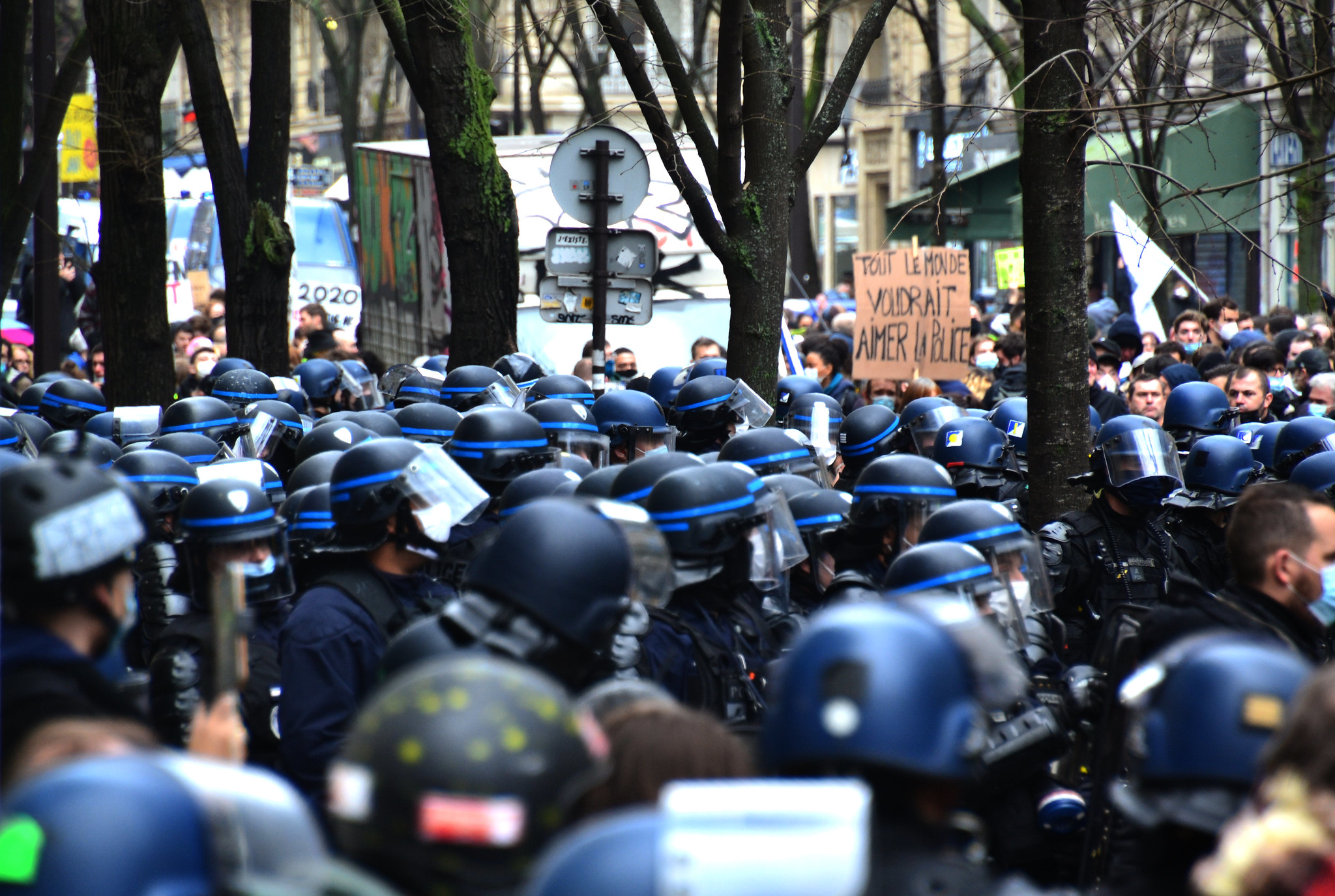
As Jews, this is unusual — even within leftist Jewish anti-racist movements today, there’s still a focus on antisemitism. You can’t touch the memory of the Holocaust, and as soon as you start putting it in parallel with other forms of state violence, it’s seen as an attack on Jews — almost as antisemitic. We’re trying to present a different perspective, which is to say that many groups have been the victims of state violence in France. This is not to minimize the Holocaust, or what our ancestors suffered, at all — it’s more to say that we can’t act as if in France today, the state is not producing new forms of racism and persecution.
A few days ago there was the national commemoration for the Vel d’Hiv round-up in France, and it was another example of a double standard of commemorating past state racist violence while closing one’s eyes to how the state is perpetuating violence today. We want to highlight this as Jews, and we want to learn from the past in order to prevent the continued implementation of state racism today.
NJ: We also need to think about Jewish people in France, because they are also victims of state racism and Zionist organizations. Young Jewish people are put into a Zionist mental trap of saying, “you are different, they hate you, you need to be separate, you need to be careful.” Like many Jews I was part of this space, and it’s important for us to try and speak to those Jewish communities and say that even if you are afraid, it doesn’t mean that the fear is legitimate and it shouldn’t be the motor for your political orientation. There is something about fear being the fuel for politics inside Jewish communities that we need to address. And it’s very hard.
You launched Tsedek! during a tumultuous period in Israel-Palestine — between the formation of the most far-right Israeli government ever, settler pogroms, and the so-called “pro-democracy protests” that have been rocking the country for months. How has the French-Jewish community responded to this moment? And what is Tsedek!’s stance on the Israeli protests, if you have one?
NJ: French-Jewish organizations are very, very careful on this subject. They are not comfortable with it. The Jewish community in France is very different from in the U.S. There’s no radical position in France against the judicial overhaul, just very timid responses.
DL: Comparing what happened in the U.S. with what was happening here, it’s night and day. In the U.S., even liberal Zionists were saying [the judicial overhaul] is too much. Here there were a few debates on national television and one or two articles in the newspaper, but there wasn’t even [any discussion] on needing to “defend democracy” [in Israel]. There’s this idea in France that if you criticize Israel, you’re threatening French Jews. It almost goes without saying that anti-Zionism is antisemitism — the belief is that you are putting French Jews at physical risk if you criticize Israel in any way. So people don’t do it.
NJ: Liberal Zionists tried to save face by distancing themselves from what they define as the “bad guys” — the Kahanists, the right wing, the center right — and the French media and society buy this discourse, especially because it creates a line between religious and secular. In France, it’s very comfortable to say, “the bad guys are wearing a kippah.” But if you dive more deeply into the protests and the judicial overhaul, you see that it’s not about religion — it’s about nationalism, it’s about annexation, it’s about depriving Palestinians and minorities of rights.
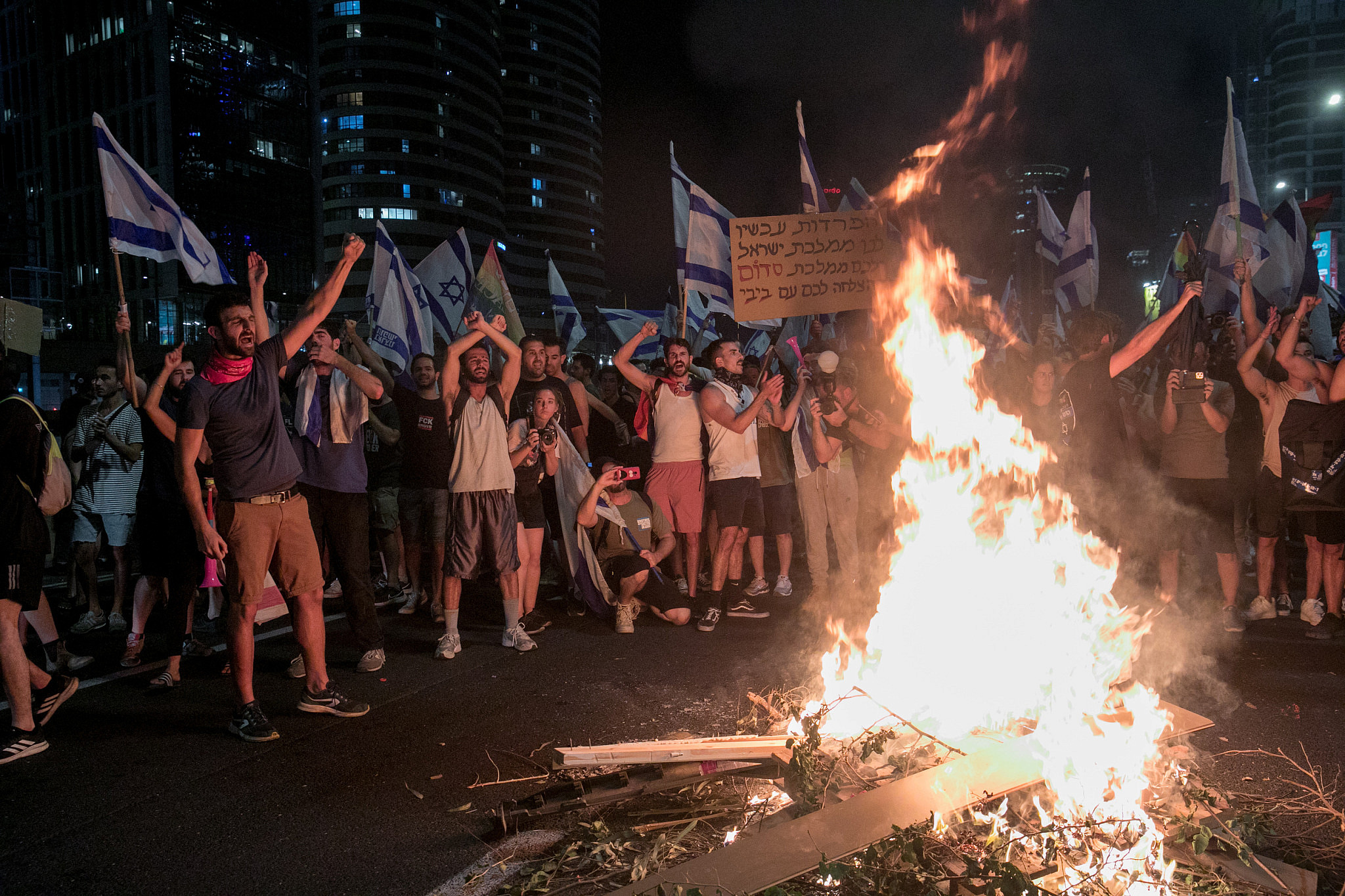
Our stance in Tsedek! is that the movement in the streets of Tel Aviv, Jerusalem, and Haifa is a movement for “Jewish democracy” — not democracy. We are in solidarity with all the organizations in Israel that are trying to inject the questions of apartheid and occupation into the movement. But we are very clear about the fact that this movement, as with everything in Israel, is fueled by militarism, racism, and even intra-Jewish racism. We support [the protest movement], but we are not naive about the forces behind it.
SA: French Jews today are largely pro-Israel, and even very right wing, because the ideological and political conditions are right. There is great denial and ignorance among many Jews [in France] of the reality in Palestine. That is because there is a lot of Israeli propaganda, and the main Jewish organization in France [CRIF] repeats this propaganda over and over. I think French Jews are, in their minds, like Israeli Jews — they have a siege mentality.
In France, as in many Western countries, the fight against antisemitism is undermined by ongoing efforts to conflate criticism of Israel with anti-Jewish prejudice, even as actual incidents of violent antisemitism continue to take place. Can you walk us through this in the French context, and talk about how Tsedek! positions itself on this front?
DL: We’re concerned with how antisemitism is being framed in the dominant discourse — by the state, by the so-called Jewish establishment — which is that the number one problem is the far left and Islamists, and that the “new antisemitism” of the 2000s onward is the biggest threat to Jews.
I was just looking through the most recent American Jewish Committee study of antisemitism in France, and they identify hatred of Israel as the number one cause of antisemitism. It’s a problematic study, because they interview three groups: Jews, the “general” French population, and Muslims. They have a whole section about Muslim perceptions of Jews, but they don’t have that for Catholic perceptions of Jews, for example. They presented the study at the French national assembly, and then politicians recycled the statistics.
So we’re concerned by the increasing silencing of [the threat of] the far right, neo-Nazis, conspiracy theories — all these forms of antisemitic discourse and violence coming from segments of the French political sphere that are now no longer seen as quite as threatening, and that enables their normalization. You see it in the government’s discourse — Marine Le Pen [former leader of the far-right National Rally party] is now almost less threatening to Jews than [leftist politician] Jean-Luc Mélenchon.
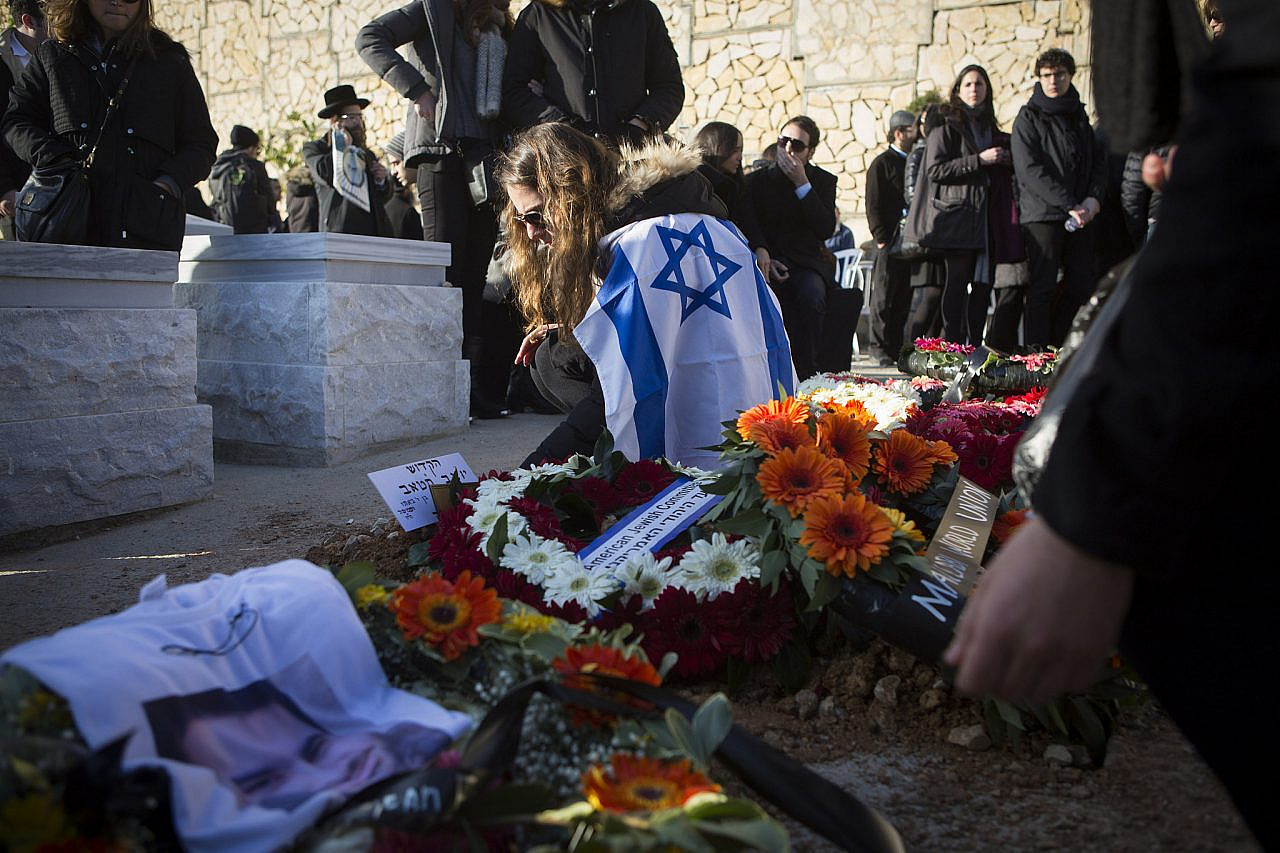
SA: The instrumentalization of the fight against antisemitism produces antisemitism, and it blinds us to the rise of the far right and the antisemitism that goes with it. Antisemitism in Muslims and Arab populations — because that is what we’re often talking about — is produced mainly by the weight of colonial history in North Africa, and by the situation in Palestine. To fight these forms of antisemitism — which do exist, we’re not saying that there is not antisemitism among these populations — we need a global, anti-racist and anti-imperialist political project.
Is there anything we haven’t discussed that you think we’ve overlooked?
NJ: We often hear that it’s antisemitic to say that all Jews are responsible for what’s happening in Palestine. We agree that this is false, and we hear it more and more from groups on the left. [Yet] we think that we have a responsibility in changing what is going on there, because our voice is twice as loud as other voices. It is much harder to silence us than people who don’t identify as Jewish.
Concerning racism in France, I think it’s important to understand that the status of Jewish people in France is temporary and conditional, and this is why we need to build solidarity with other oppressed groups, [especially] those who are less privileged.
DL: We want to present a Jewish voice that says that speaking about Israeli apartheid is not antisemitic. This is the number one thing preventing the political sphere in France from having a conversation on what is actually happening in Israel-Palestine. We saw this most recently in the debate in parliament around the communist party’s proposed resolution against Israeli apartheid. It was astounding to see that on the right, and among most left-wing parties, the dominant discourse was that the resolution was antisemitic and that Israel needs to be protected.
In France there’s often a focus on letting the people most affected speak, instead of speaking for them. So we want to use our identity as Jews to push forward the argument that talking about apartheid is talking about human rights and Palestinian rights, and it’s not antisemitic. We’re striving to normalize this discourse as coming from the Jewish community, and not just from other anti-racist movements or Palestinian solidarity movements.
For the French state, it is a threat for Jews and other minorities to work together — it’s part of the colonial mentality. It’s to their benefit for us to be divided, and we want to work against that.
NJ: We shouldn’t expect anything from a state that still applies racist and imperialist policies all around the globe, that has military stations in every continent, that kills kids in the street and offers no justice. As long as the state is racist and colonialist, we as Jews should not rely on it for our protection and well-being.

